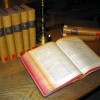The Etymology of Magnets
We often take the everyday words we use for granted. Where do they come from? How were they formed? When was the first time they were used? These are questions the study of etymology strives to answer. The subject of this blog post is the etymology of the word “magnet” and its derivations (magnetism, magnetize, magnetization).
While it’s very difficult to account for a word’s very first utterance, we’ve gotten pretty good at tracking down its first printing. Organizations like the Oxford English Dictionary have staffers devoted to poring through thousands of documents, searching for earlier and earlier examples of words. Through tireless research, they’ve collected a pretty interesting timeline of the word.
In its roots, “magnet” is a Greek word that entered the Latin language somewhere around the 1st Century. The first version of the word to appear in English was back in the 6th century. While its origins aren’t clear, it is thought to come from what was essentially an instruction or lapidary for people who worked with gems and precious metals. The passage describes (in Old English) the properties of a magnet. Don’t worry if you can’t read it; English has changed quite a bit in the last 1,500 years:
“Sum stan hatte magneten; gif þæt isern bið bufan þæm stane, hit wyle feallan on þane stan; gyf se stan bið bufan, hit wile springen up ongean þæne stan.”
Loosely translated as:
“Some stones have magnetism; if there is iron above the stone, [the iron] will plummet on that stone; if that stone is above [the iron], it will spring up against the stone.”
What makes this passage particularly interesting is what it demonstrates about technology and trade in the 6th century. Prior to this era, magnetism was regarded as an almost supernatural phenomenon. It’s easy to imagine a tradesman with no formal education witnessing magnetic force and being completely mystified.
The passage above, although simple and obvious in the 21st century, must have put a lot of people at ease. “Oh, so it’s supposed to do that,” they may have thought. Here are some other examples from the Oxford English Dictionary of magnetic words entering the lexicon:
- 1447 “Hyr face..his herte drow as the magnet doth iryn.” O. Bokenham Lives of Saints
- 1616 “ What I had built vpon his foundation of the Magnetisme of the earth.” W. Barlow Magneticall Aduertisements Ep. Ded. sig. A2
- 1655 “These are the Magnets which so strongly move And work all night upon thy light and love.” H. Vaughan Silex Scintillans (ed. 2)

